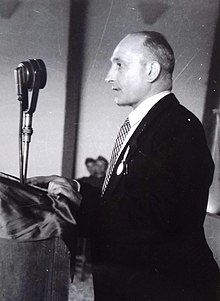Sejfulla Malëshova
In 1924, a 23-year-old Malëshova was Fan Noli's personal secretary. He held that position after having studied medicine in Italy. After Noli's government was overthrown, Malëshova fled to Paris and then to Moscow, where he studied and then taught Marxism.
Sejfulla Malëshova (March 2, 1900, Këlcyrë[1] – June 9, 1971, Fier) was an Albanian politician and writer.Sejfulla Malëshova
Sejfulla Malëshova giving a speechBorn Sejfulla Malëshova
March 2, 1900
Këlcyrë, Përmet District, Gjirokastër County, AlbaniaDied June 9, 1971 (aged 70)
Fier, AlbaniaPen name Lame Kodra Occupation Writer, politician Language Albanian Citizenship Ottoman, Albanian
Career
In 1930-1932, he joined the Communist Party of the Soviet Union, but was subsequently expelled as a Bukharinist.[2] He became a charter member of the Albanian Communist Party and a member of its Politburo prior until 1946.[3] He used to appear as a self-proclaimed rebel poet of the guerrilla war against the Italian and German occupying armies in Albania, and became known by his pen name, Lame Kodra. In 1945, he was appointed Minister of Culture and Propaganda. In the same year, he was elected president of the newly founded Albanian League of Writers and Artists, which consisted of 74 members initially, with several non-communist intellectuals among them. The League took over the publication of well-known Albanian literature Drita magazine.
Malëshova had emerged as a moderate communist, often inviting publications without regard to their ideological content, which earned him the wrath of Enver Hoxha, particularly after an appeal by the Writers League to Harry Truman and Clement Attlee for Western recognition of Albania. In 1946, Hoxha accused Malëshova of "rightist deviation" and expelled him from the communist party. Following his dismissal, persecution of the writers ensued, many of whom were harassed and imprisoned by the authorities.
Malëshova spent the rest of his life as a warehouseman in Fier, shunned by almost all his fellow citizens. If anyone dared speak to him, he would pinch his lips with his fingers, to remind them of the vow of eternal silence which would ensure his survival. He died an outcast in 1971. His funeral was attended only by his sister, the gravedigger and two Sigurimi agents.[4][5]
References
- Në kujtimet e Nexhmi Ballkes
- Albanian literature: a short history By Robert Elsie, Centre for Albanian Studies (London, England) pp. 163-164. [1]
- Joseph Held (1994). Dictionary of East European History since 1945. Westport, CT: Greenwood Press. pp. 63–64.
- Robert Elsie (1991). "Albanische Literatur und Kultur nach sechsundvierzig Jahren Sozialismus. Ein Zustandsbericht" (PDF). Südosteuropa - Zeitschrift für Gegenwartsforschung (in German). 48 (11–12): 600–613.
jueves, 23 de mayo de 2019
Sejfulla Malëshova
Suscribirse a:
Enviar comentarios (Atom)
No hay comentarios:
Publicar un comentario